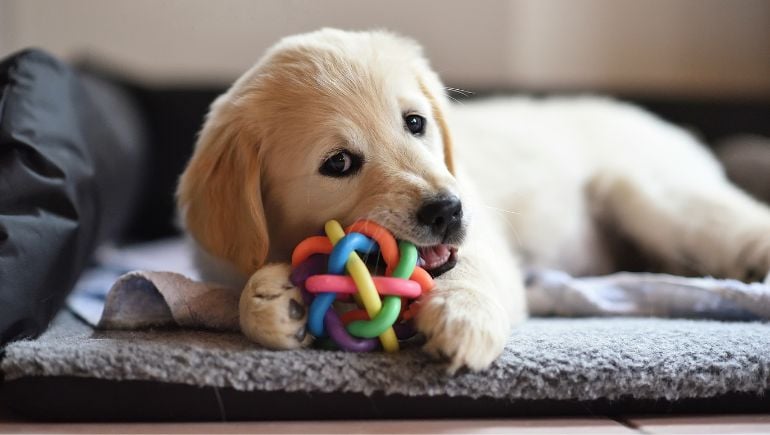Why Puppies Chew: A Complete Guide
Posted on July 2, 2025 by Team Gorilla

If your puppy has chewed up a toy, shoe, or piece of furniture, you are not alone. Chewing is a natural behavior, especially for puppies, but when it becomes destructive, it can damage your home or even pose risks to your pup’s health. Let us explore the reasons behind this behavior and offer solutions that are both effective and gentle.
Biological Reasons and Physical Benefits
Chewing offers more than entertainment for dogs. It helps build jaw strength, cleans their teeth, and provides mental stimulation. For puppies the need is more intense during teething when baby teeth fall out around three to four months and adult teeth arrive by six months. Chewing on cold or frozen toys helps soothe inflamed gums and eases discomfort.
Emotional Triggers: Stress, Boredom, and Anxiety
Chewing can calm nerves. Puppies experiencing stress from changes in routine environment or being left alone often chew to self-soothe. If you return home to find shredded cushions or torn blankets, separation anxiety could be at play. Insufficient mental or physical stimulation also leads puppies to chew for entertainment. Evidence shows that understimulated dogs left alone are more prone to destructive chewing.
Excitement or Compulsive Chewing
Sometimes, chewing becomes repetitive and hard to interrupt. This is known as compulsive chewing and may occur due to stress, early weaning before seven or eight weeks, or health concerns. Excitement chewing happens when your pup is overly enthusiastic, for example, when greeting visitors or seeing squirrels through a window. This can be resolved with redirection and training.
Chewing When Hungry
Believe it or not, chewing may simply signal hunger. Puppies on restricted calorie plans or with big appetites may chew on any food-scented item, hoping to find a snack.
How to Prevent Destructive Chewing
Provide Suitable Chew Options
Offer a variety of safe, durable toys that hold your puppy’s interest. Frozen toys, rope-free classics, and tough rubber options are excellent. Research supports that long-lasting chews reduce stress and improve emotional state during alone time.
Also, having a chew-proof bed is essential during this phase,e so you can spend more time with your pup than at the store. Giving them their own space to rest helps quell anxiety and helps them to feel like they are a part of the family.
Redirect With Kindness
When your pup goes for your slipper, calmly say no take it away, and offer an approved chew toy instead. Praise them when they choose correctly. Avoid scolding later, as dogs don’t link punishment to past behavior.
Remove Temptations
Keep valuables such as shoes, books, and cords out of reach. When unsupervised, confine your pup in a secure area or crate for no more than six to eight hours. Make sure it’s a positive space, not a punishment zone.
Rotate Toys Regularly
Switch out toys to maintain novelty and interest. Use puzzle feeders or treat dispensers for mental enrichment.
Keep Them Active
A physically and mentally tired puppy is far less likely to chew destructively. Regular walks, training, interactive play, and scavenger games make a big difference.
Tackle Stress or Anxiety
If chewing spikes during alone time, use gradual desensitization. Practice short departures increase time away slowly, use background noise, calming treats, or vet-recommended tools. For severe anxiety, talk with your veterinarian about treatment options.
Seek Professional Help When Needed
If chewing seems obsessive or poses health risks, speak with your vet or a certified behaviorist. They can identify medical or behavioral issues and design a tailored plan.
In Summary
Puppy chewing is driven by natural and emotional factors such as teething, jaw comfort, boredom, stress, excitement, or hunger. It is normal yet shapeable. By offering safe chew toys, positive redirection, physical exercise, mental stimulation, and a peaceful environment, you can encourage good chewing habits. This approach helps your puppy thrive and protects your home.
